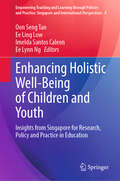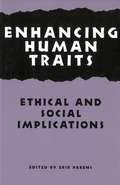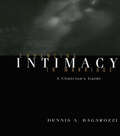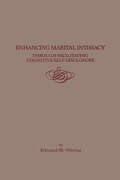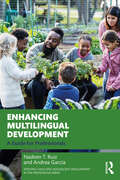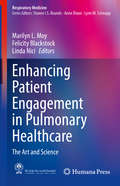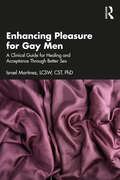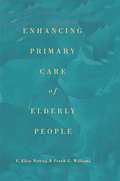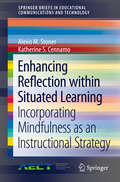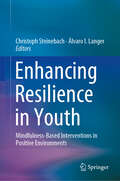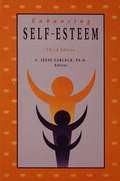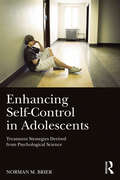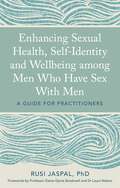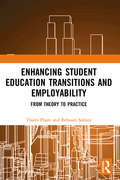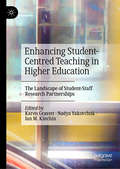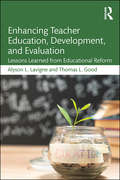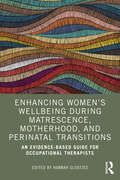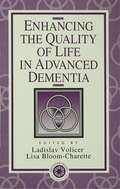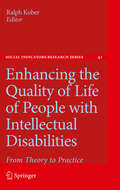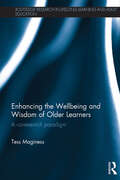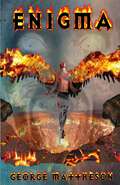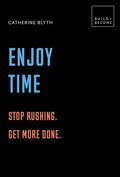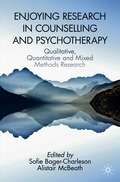- Table View
- List View
Enhancing Holistic Well-Being of Children and Youth: Insights from Singapore for Research, Policy and Practice in Education (Empowering Teaching and Learning through Policies and Practice: Singapore and International Perspectives #4)
by Ee Ling Low Oon Seng Tan Imelda Santos Caleon Ee Lynn NgThis book documents and chronicles current research and initiatives, and growing knowledge base about well-being, in a Singapore context. In Singapore, the well-being of children and youth has been the subject of research and policy efforts. This is reflective of global and national concerns on the care of the young and those at risk of maladaptive outcomes, the nurturing of emotional health and resilience, and development of social and psychological resources. The chapters present a brief yet comprehensive summary of current insights on the well-being of children, adolescents, teachers, parents, and caregivers within the context of Singapore. This book highlights important issues and gaps in research related to the well-being of children and adolescents that are also relevant to the global community. It also provides recommendations for future directions that will be useful to researchers, policymakers, practitioners, parents, and other key stakeholders.
Enhancing Human Traits: Ethical and Social Implications
by Erik ParensIn this volume, scholars from philosophy, sociology, history, theology, women's studies, and law explore the looming ethical and social implications of new biotechnologies that are rapidly making it possible to enhance an individual's mental and physical attributes in ways previously only imagined. To clarify the issues, the contributors grapple with the central concept of "enhancement" and probe the uses and abuses of the term. Focusing in particular on the moral issues pertaining to cosmetic surgery and cosmetic psychopharmacology (a category which includes Prozac), they also examine notions of identity, authenticity, normality, and complicity. Other essays in this collection address the social ramifications of the new technologies, including the problems of access and fairness.
Enhancing Intimacy in Marriage: A Clinician's Guide
by Dennis A. BagarozziMost people believe that intimacy is a unitary construct-that is, that it is made up of only one component. Dr. Bagarozzi demonstrates how intimacy is comprised of at least nine separate subcomponents. The degree to which partners can meet the intimacy needs of their mates in all nine areas is critical to marital satisfaction. Building upon the foundations of the author's Enhancing Intimacy Program, which he developed and utilized in his own practice with clients, Enhancing Intimacy in Marriage explores the ways in which intimacy is demonstrated and communicated between married partners. A simple questionnaire, the Intimacy Needs Survey, is used to help couples identify areas of satisfaction and areas where intimacy needs are not being met. Clinical strategies for helping couples improve their intimacy are presented in case examples. This book is unique in that it offers clinicians a step-by-step approach for both assessment and intervention
Enhancing Marital Intimacy Through Facilitating Cognitive Self Disclosure
by Edward M. WaringFirst published in 1988. This text describes a type of psychotherapy designed to increase marital intimacy, thus improving family functioning. The focus of this book is marriage as a psychological relationship. This is, then, a book about the quality of the relationship between a woman and a man in marriage and an approach to helping couples and families who have problems with intimacy.
Enhancing Multilingual Development: A Guide for Professionals (Applying Child and Adolescent Development in the Professions Series)
by Nadeen T. Ruiz Andrea GarcíaThis accessible volume presents an up-to-date overview of how young children, older youth, and adults develop multilingual proficiencies. Importantly, it highlights an assets view of multilingualism, offering clear recognition that multilingual competencies are both functional and highly valued in communities across the globe.Dispelling common myths, it explores the benefits of multilingualism spanning interpersonal, academic, and professional settings. With these settings in mind, the book provides practical information on how professionals can promote effective communication with colleagues and clients from a variety of language backgrounds. Each chapter comes equipped with a series of true or false statements where you can record your predictions and learn as you read. Chapters cover topics including the economic and cognitive benefits of multilingualism, social influences, the age factor, family bilingualism and optimal teaching and learning conditions. Finally, the book concludes by providing various step-by-step resources for creating optimal conditions that further develop and support multilingualism in your professional field.Containing suggestions for research-based practices in home, school, and professional settings to enhance multilingual development, this book is essential for professionals working with multilingual young children, older youth, and adults, as well as those who require a foundational understanding of multilingualism.
Enhancing Patient Engagement in Pulmonary Healthcare: The Art and Science (Respiratory Medicine)
by Linda Nici Marilyn L. Moy Felicity BlackstockThis book examines the most up-to-date strategies that can be used to enhance the healthcare professional-patient interaction to influence positive behavior change and improve treatment adherence in pulmonary healthcare. This book is written by experts in the field who couple their experience with practical strategies (the art) with evidence-based theory (the science).Chapters discuss global concepts such as motivational interviewing on improving engagement and how to apply strategies to specific situations (for examples: smoking cessation, promoting physical activity, inhaler adherence, supplemental oxygen use, and non-invasive ventilation) commonly experienced on the front lines of caring for patients with pulmonary disorders. The textbook raises awareness of direct approaches and recent technological advances that healthcare professionals can use to support positive behavior change in their day-to-day clinical practice. Effective, patient-tailored self-management interventions are discussed, including the evidence for these interventions and ways to personalize the strategies to each patient’s unique needs. This book is an ideal guide for healthcare professionals working with patients experiencing chronic pulmonary conditions, including pulmonologists, primary care physicians, physician assistants, nurses, trainees, and the many allied health professionals involved in delivering care such as respiratory therapists, pharmacists, and behavioral psychologists. The concepts of this book can also be applied to the management of other chronic diseases such as coronary artery disease and diabetes mellitus.
Enhancing Pleasure for Gay Men: A Clinical Guide for Healing and Acceptance Through Better Sex
by Israel MartinezThis book aims to help therapists understand the challenges gay men face in their sex lives, providing professionals and gay men with evidence-based interventions and clinical tools to help them heal and live overall healthier lives.Gay men have unique and debilitating issues that can get in the way of them having pleasurable sex. Instead of sex being a space to learn about themselves, heal, release, and receive joy, for many sex is fraught with shame, anxiety, self-hate, and feeling isolated. Written for both professionals and the clients they treat, this book aims to heal sex-related wounds through sex and, in turn, improve every aspect of gay men’s mental health. The book begins by exploring what is special about gay men and sex before looking at assessing and presenting medical issues impacting sexual functioning, such as childhood trauma, attachment styles, body issues, anxiety, depression, long-term relationships and parenting, and hookup apps. It then moves onto clinical interventions to address these issues, with intake questionnaires and information on how to adapt sensate focus exercises, neuroscience, narrative, CBT, and somatic modalities to provide sex therapy interventions specific to gay men.With special focus on marginalized communities within the LGBTQIA+ community, such as trans men, BIPOC, aging, disabled, and chronically ill voices, this book is essential reading for sex therapists and mental health professionals working with gay men, as well as gay men themselves looking to live authentically and happily in their sexual lives.
Enhancing Primary Care of Elderly People (Garland Reference Library Of Social Science Ser. #Vol. 1142)
by F. Ellen Netting Frank G. WilliamsFirst published in 1999. Routledge is an imprint of Taylor & Francis, an informa company.
Enhancing Reflection within Situated Learning: Incorporating Mindfulness As An Instructional Strategy (Springerbriefs In Educational Communications And Technology Ser.)
by Alexis M. Stoner Katherine S. CennamoThis innovative brief provides guidance on promoting reflection in situated learning by incorporating mindfulness strategies, tapping into a surge of research interest in exploring mindfulness as an instructional strategy associated with positive learning outcomes. It illustrates the benefits of continuous reflection within situated learning and how mindfulness can be incorporated before, during, and after the learning experience to enhance the reflective experience. Critically, the authors present a new conceptual model that synthesizes theories and methods from three different areas of study—mindfulness, situated learning, and reflection— to provide a new perspective and instructional approach that has great potential to positively impact outcomes in situated learning.Among the other topics covered:• Strategies for reflection in situated learning.• Strategies for reflection-in-action in situated learning.• Mindfulness strategies for situated learning.• A conceptual model incorporating mindfulness to enhance reflection.Enhancing Reflection within Situated Learning is an exciting and pioneering resource that offers practical guidance to educators and instructional designers interested in incorporating methods and approaches for integrating mindfulness and reflection across instructional environments.
Enhancing Resilience in Youth: Mindfulness-Based Interventions in Positive Environments
by Christoph Steinebach Álvaro I. LangerThis book shows how to plan, refine, and implement peer-supported mindfulness-based interventions to prevent mental disorders in children and youths. It focuses on interventions designed to maintain psychosocial health and prevent emotional and behavioral problems in children and youths around the globe. By combining a range of research perspectives, the book connects mindfulness to pro-social behavior, and to positive social and physical environments, in order to enhance resilience. In addition, it presents theoretical aspects and practical recommendations on how to promote mental health and healthy lifestyles in adolescents, such as school-based interventions. Gathering contributions by an international network of researchers and practitioners, the book offers not only state-of-the-art theoretical descriptions of key concepts and interventions, but also best practices for implementing them to strengthen resilience.
Enhancing Self Esteem
by C. Jesse CarlockProviding comprehensive coverage of self esteem, this text presents a four phase process - Identity, Strengths and Weaknesses, Nurturance, and Maintenance - which is described along with the resistance on encounters, and provides the basis for successfully enhancing self-esteem. Interventions are outlined to bring together theory and methods - cognitive, emotional, and behavioral. The strategies included are applicable to several populations (child, teen, and adult) and several settings (school, business, and community).For both children and adults, this book is designed to be a textbook for courses, workshops, and seminars. It will also serve as an excellent resource for teachers and counselors and will be used by individuals for self-improvement. Some key features of the third edition are: It translates theory into practice; provides 107 activities with specific procedures and anticipated outcomes; relates each activity to one of four phase processes; utilizes a systematic approach to enhancing self esteem; incorporates cognitive, emotional, and behavioral aspects of individuals.
Enhancing Self-Control in Adolescents: Treatment Strategies Derived from Psychological Science
by Norman M. BrierThis book offers an innovative, trans-diagnostic approach to enhancing self-control in adolescents based directly on personality and social psychological science. It thus fills a void. While several books address specific disorders such as ADHD, poor school performance, and aggression, this is one of the first books to translate social and personality psychology research into a set of generally applicable treatment strategies. This literature as a whole is not well known to cognitive behavioral therapists or other applied mental health professionals and will be a valuable addition to their clinical knowledge base.Because the interventions described in the book target the underlying processes common to self-control (rather than to specific diagnostic entities), clinicians do not have to master a treatment manual for each individual disorder. Instead, they are provided with treatment tools that they can modify and use flexibly with the large number of adolescent referred because of problems with self-control, who typically present with a range of symptoms and co-morbid disorders.
Enhancing Sexual Health, Self-Identity and Wellbeing among Men Who Have Sex With Men: A Guide for Practitioners
by Rusi Jaspal Dr Laura Waters Professor Dame BreakwellBy analysing research into links between low psychological wellbeing and sexual risk-taking behaviours that occur in men who have sex with men (MSM), this book demonstrates what impact social and psychological interventions could have on MSM at risk of poor sexual outcomes. At the heart of the book is Identity Process Theory, co-developed by the author, a social psychological theory of identity construction, threat and coping. The book considers the emerging debates in MSM's health, such as the use of Grindr and 'chemsex', and also explores the socio-structural factors, such as homophobia and stigma, that threaten the self-identity of MSM. The book offers principles and techniques from this theory that can be used as an effective intervention and therapeutic model with MSM to build more positive identities and reduce sexual risk-taking.
Enhancing Student Education Transitions and Employability: From Theory to Practice
by Thanh Pham Behnam SoltaniThis book explores student education transition and employability negotiation experiences in various contexts. It explores determinants of student transitions at three levels including macro, meso and micro but focuses on exploring affordances, constraints and strategies at the micro level. The framework underpinning the explorations at the micro level covers a range of different forms of capital including human, culture, social, identity, psychological and agentic. The book is unique in three ways. First, it consists of chapters about critical discussion, empirical research and practical guidance about student transition experiences. The critical discussion and empirical research chapters explore and obtain insights about the complexity of student transitions and develop conceptual frameworks that guide the development of applicable practices. The book is, therefore, a useful resource for policy makers, institutions, academics, professionals and students. Second, it provides insights about how student transitions are determined by a range of factors at different levels. These insights extend discussions about student transitions in the current literature which have mainly explored impacts of policies, institutional programmes and human capital. Finally, it is international in focus because it draws on research with different cohorts of students and graduates in different contexts. Insights provided in the book are, therefore, rich, diverse and comparative.
Enhancing Student-Centred Teaching in Higher Education: The Landscape of Student-Staff Research Partnerships
by Ian M. Kinchin Karen Gravett Nadya YakovchukThis book explores student-staff partnerships through a breadth of co-authored research projects. There is a significant gap in current literature regarding student-staff partnerships, both in the sharing of examples as well as in the examination of partnership working and its impact. Organised into four thematic sections, the editors and contributors highlight the diversity of routes students and staff can take to work in partnership, as well as how research, learning and teaching can be co-created. Written by both university staff and student researchers, the chapters consider the benefits of student-staff partnerships as an antidote to consumerist visions of higher education, and a way of celebrating the potential of students and their voices. This book will be of interest and value to scholars of student-staff partnerships.
Enhancing Teacher Education, Development, and Evaluation: Lessons Learned from Educational Reform
by Thomas L. Good Alyson L. LavigneEnhancing Teacher Education, Development, and Evaluation examines the complex role that recent educational reforms have played in the teaching profession. The failure of programs like Race to the Top to benefit teaching and learning outcomes has yielded many questions about what went wrong and how a research-based plan for true systemic progress could actually work. Covering inaccurate narratives about schools and student achievement, evidence for teacher effectiveness, and the history and repercussions of Race to the Top, this book culminates with a proposal for future research and policy initiatives that more accurately and more equitably prioritize the measurement and improvement of teaching and learning. Five concise yet comprehensive chapters invite teacher and principal educators, teachers and school leaders in training, district administrators, policymakers, and other stakeholders to better understand the implications of and possible paths beyond misguided reform efforts. An overview of the recent past and an inspiration for the immediate future, this definitive analysis offers insights into how more reasonable, empirically derived strategies will ultimately foster more successful schools.
Enhancing Women’s Wellbeing During Matrescence, Motherhood, and Perinatal Transitions: An Evidence-based Guide for Occupational Therapists
by Hannah SlootjesGuided by research and occupational therapy practices, this evidence-based text maps how occupational therapists and the allied health collective can holistically promote women’s health, wellbeing, and self-efficacy during matrescence – the bio-psycho-social-political-spiritual-developmental journey and rite of passage of mother-becoming.From person-centred, gender-sensitive, and feminist perspectives, this book introduces a compassionate and non-medicalised framework guiding how health and wellbeing professionals can engage responsively with women during motherhood journeys. Building on doctoral research exploring the role of occupational therapists in perinatal health, this guide includes occupation- and co-occupation-based theories, models, and frameworks for supporting women’s transitions and transformations as individuals, and mother-infant dyads. Bolstered by learning objectives, case studies, summaries and reflective questions, the chapters feature a collection of innovative occupational therapy approaches to support women struggling with overwhelm, burnout, and other common, normalised issues across the lifespan–from womanhood to grandmotherhood, and menstruation to menopause. Further, the book sheds light on the ‘dark side’ of motherhood occupations, outlining holistic strategies to promote functional capacities, empowering and enabling women work to through the impacts of role overloading, disrupted identity, shame, dysfunction, and perinatal trauma.A much-needed addition to the perinatal care field, this essential guide is tailored for occupational therapy, mental health and other healthcare practitioners and postgraduate students working in perinatal health and matrescence.
Enhancing the Quality of Learning
by John R. Kirby Michael J. LawsonHigh quality learning is extensive, well integrated, deep, and supports the use of knowledge in new situations that require adaptation of what has been learned previously. This book reviews current research on the nature of high quality learning and the factors that facilitate or inhibit it. The book addresses relationships between quality of learning and learners' dispositions, teaching methods, cognitive strategies, assessment and technologies that can support learning. The chapters provide theoretical analyses, reports of classroom research, and suggestions for practical application for both teachers and learners. The book will be of value to teachers at all levels of education and provides guidance for students about how to approach classroom tasks in order to develop high quality learning.
Enhancing the Quality of Life in Advanced Dementia
by Ladislav Volicer Lisa Bloom-CharettePublished in 1999, Enhancing the Quality of Life in Advanced Dementia is a valuable contribution to the field of Psychotherapy.
Enhancing the Quality of Life of People with Intellectual Disabilities
by Ralph KoberThis book contains a series of articles, written by international experts in the fields of intellectual disability and quality of life, that explore a broad range of issues that impact on the quality of life of people with intellectual disabilities and their families. The book commences with a general discussion on defining quality of life and family quality of life and the appropriateness of using these constructs in the field of intellectual disability, and is followed by an analysis on the effects of living arrangements and employment on quality of life. The book concludes with discussions on the unique issues facing children with intellectual disabilities and people living in developing countries and the effect these issues have upon their quality of life.
Enhancing the Wellbeing and Wisdom of Older Learners: A co-research paradigm (Routledge Research in Lifelong Learning and Adult Education)
by Tess MaginessEnhancing the Wellbeing and Wisdom of Older Learners: A Co-research Paradigm examines how lifelong learning, becoming wise, and sharing wisdom are integrally linked to older people’s wellbeing. The book highlights appropriate learning styles and pedagogies for older people, including research models emphasising participation, and offers recommendations for research in lifelong learning with the potential to effect change. Focusing upon a collaborative action research project, ‘Sagaciation’, chapters explore the involvement of older learners in the design and delivery of the scheme, which enabled them to expand their knowledge and skills, and to fully engage as critical and creative voices in a supportive and welcoming environment. The book offers an account of the process of the action research, as well as its findings. The project is set into the context of leading academic thinking on fields such as the growth of an ageing population, the rise of literature on ageing, negative and positive constructions of ageing, social gerontology, the wellbeing and health of older people, and educational gerontology. This book challenges negative representations of older people as a burden by offering a paradigm of hope, resilience, and sagacity within education and beyond. It will appeal to researchers, academics and postgraduate students in the fields of adult education, lifelong learning, gerontology, mental health and wellbeing, and the sociology of education, as well as to policymakers and those working with older people
Enigma
by George MatthesonIn this unique memoir, a diagnosed schizophrenic takes readers inside his experience of reality blending with hallucination.George Mattheson was born in Guyana and grew up in Trinidad and Tobago before settling in the United States. At age twenty-seven, he was diagnosed with schizophrenia and bipolar disorder. In Enigma, Mattheson shares his experience growing up talking to the Archangel Michael and providing intelligence to the CIA. For the son of intelligence operatives, the CIA was God and Washington, DC, was God&’s church. &“I have been experiencing the effects of stigmata lately, so I started to write this novel the best way I know how, by sharing both truth and fiction. For the truth, you&’ll have to find it on your own, but the fiction part is what I see in visions, memories, and dreams. It holds a hidden meaning for only the wise to decipher.&” —George Mattheson, from Enigma
Enigmas of Identity
by Peter BrooksFrom eminent critic Peter Brooks, an exploration of the modern preoccupation with identity"We know that it matters crucially to be able to say who we are, why we are here, and where we are going," Peter Brooks writes in Enigmas of Identity. Many of us are also uncomfortably aware that we cannot provide a convincing account of our identity to others or even ourselves. Despite or because of that failure, we keep searching for identity, making it up, trying to authenticate it, and inventing excuses for our unpersuasive stories about it. This wide-ranging book draws on literature, law, and psychoanalysis to examine important aspects of the emergence of identity as a peculiarly modern preoccupation.In particular, the book addresses the social, legal, and personal anxieties provoked by the rise of individualism and selfhood in modern culture. Paying special attention to Rousseau, Freud, and Proust, Brooks also looks at the intersection of individual life stories with the law, and considers the creation of an introspective project that culminates in psychoanalysis.Elegant and provocative, Enigmas of Identity offers new insights into the questions and clues about who we think we are.
Enjoy Time: Stop Rushing. Get More Done. (Build + Become)
by Catherine BlythGain a better understanding of the nature of time and learn how to manage your time and improve your life.We are living longer than ever and, thanks to technology, we are able to accomplish so much more. So why do we feel time poor? In twenty eye-opening lessons, Catherine Blyth combines cutting-edge science and psychology to show why time runs away from you, then provides the tools to get it back.Learn why the clock speeds up just when you wish it would go slow, how your tempo can be manipulated and why we all misuse and miscalculate time. But you can beat the time thieves. Reset your body clock, refurbish your routine, harness momentum and slow down. Not only will time be more enjoyable, but you really will get more done.
Enjoying Research in Counselling and Psychotherapy: Qualitative, Quantitative and Mixed Methods Research
by Sofie Bager-Charleson Alistair McBeathThis textbook provides a guide to the development of a rigorous and creative research-supported practice for students, practitioners, and researchers in counselling and psychotherapy. With an emphasis on critical thinking and “research mindedness”, it introduces practical research skills and links them to self-awareness and critical reflection. Learning how to creatively and effectively use oneself in the treatment process is an essential component in therapy training and this level of self-awareness has long been a neglected area in research – until now. With examples ranging from private therapeutic practice to psychiatric related research, each chapter combines ‘how-to-do-it’ advice with illustrative real-life examples. The authors outline the use of a broad range of research methods, embracing Arts- as well as RCT-based research, and covering qualitative, quantitative, pluralistic and mixed methods approaches. Whether you are engaging with research for the first time or already developing your own research projects, if you are a student at diploma level or taking a Postgraduate research course for counsellors, psychotherapists and counselling psychotherapists, this is essential reading for anyone looking for a book that combines self-awareness with analytical and practical skills.
